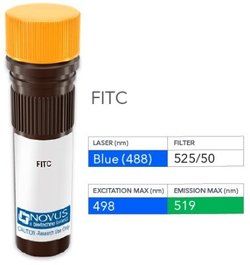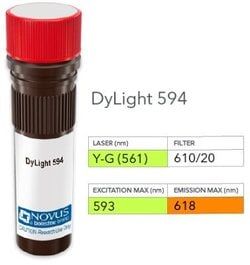TAG-72 Antibody (B72.3), DyLight 594, Novus Biologicals™
Manufacturer: Novus Biologicals
Select a Size
| Pack Size | SKU | Availability | Price |
|---|---|---|---|
| Each of 1 | NB005750-Each-of-1 | In Stock | ₹ 57,494.00 |
NB005750 - Each of 1
In Stock
Quantity
1
Base Price: ₹ 57,494.00
GST (18%): ₹ 10,348.92
Total Price: ₹ 67,842.92
Antigen
TAG-72
Classification
Monoclonal
Conjugate
DyLight 594
Formulation
50mM Sodium Borate with 0.05% Sodium Azide
Host Species
Mouse
Purification Method
Protein A or G purified
Regulatory Status
RUO
Test Specificity
Recognizes an oncofetal antigen of 220kDa, identified as a tumor-associated glycoprotein (TAG-72) with properties of a mucin. This monoclonal antibody defines the mucin-carried sialylated-Tn epitope. TAG-72 is usually expressed by adenocarcinomas, but is negative in mesotheliomas. Studies have reported that this antibody has 80% sensitivity and 93% specificity for pulmonary adenocarcinoma. Therefore, TAG-72 is a useful marker to distinguish between mesothelioma and adenocarcinoma. However, false positive reactions can occur so results must be interpreted with the utmost caution. This antibody may be useful in the differentiation of non-small cell carcinomas from small cell carcinomas of the lung. The combined use of anti-TAG-72 and anti-GCDFP-15 is valuable in the diagnosis of apocrine carcinoma.
Content And Storage
Store at 4°C in the dark.
Applications
Western Blot, Flow Cytometry, ELISA, Immunohistochemistry, Immunocytochemistry, Immunofluorescence, Immunohistochemistry (Paraffin)
Clone
B72.3
Dilution
Western Blot, Flow Cytometry, ELISA, Immunohistochemistry, Immunocytochemistry/Immunofluorescence, Immunohistochemistry-Paraffin, Immunohistochemistry-Frozen
Gene Alias
CA 72-4, Protein TAG-72, tag 72, tag-72 Protein TAG-72
Immunogen
A membrane enriched fraction of a human breast carcinoma liver metastasis was used as the immunogen for the TAG-72 (B72.3) antibody.
Quantity
0.1 mL
Primary or Secondary
Primary
Target Species
Human, Rat, Bovine, Canine, Hamster
Isotype
IgG1 κ
Related Products
Description
- TAG-72 Monoclonal specifically detects TAG-72 in Human, Rat, Bovine, Canine, Hamster samples
- It is validated for Flow Cytometry, Immunohistochemistry, Immunocytochemistry/Immunofluorescence, Immunohistochemistry-Paraffin.


